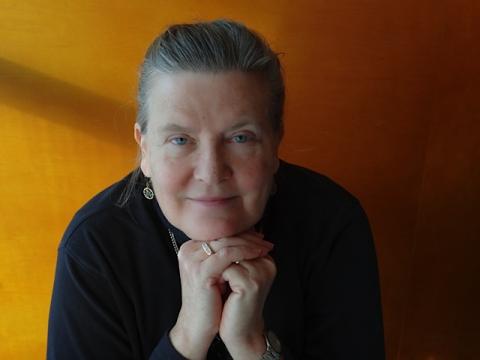Michele Hilmes and the Historiography of Discursive Analysis (Part 1)
 Post by Josh Shepperd, The Catholic University of America
Post by Josh Shepperd, The Catholic University of America
This post continues Josh Shepperd’s “On (the) Wisconsin Discourses” series from last year. This is Part 1 of 2 in a pair of posts commemorating Michele Hilmes.
Discourses as Political Will
Previous posts in this series have discussed how the “Wisconsin” tradition of media research has been informed by the Birmingham School approach to the problem of “discourse”. In short, “discourse” is a term that serves as a shorthand concept to refer to how embodiments are bound by stable yet flexible identity affiliations that respond to and intervene among social contradictions. The question of “political will” in discursive theory is defined as temporal hegemonic precedents that social ensembles interpret as they circulate representational codes among a “public”. This concept of discourse, which can be roughly approximated as a logic of how superstructural strictures influence social encounters, is usually applied through analysis of “determinants”, the “limits and pressures” faced by cultural blocs during social selectivity. “Selection” is not theorized as an opportune, consumptive, bootstrapping, or commercially based practice, but as adjustments emergent groups make in spite of limited opportunities for identity recognition or class mobility during social engagement. Discursive interactions are further guided by reference to internal histories communicable to other discursive blocs.
As Nancy Fraser, Michael Warner, Sara Ahmed, Julie D’Acci, and others have noted, publics carry inherent structural limits for group recognition. Part of the ongoing influence of the Birmingham theory of “discourse”, however, is that it accounts for macro forms of participation without prescribing a mandated mode for public engagement. Discursive theorists instead propose that a public is comprised of diachronically shifting perspectives, oriented toward social reciprocation while advocating for maximal visibility for their positions. Discursive power waxes and wanes, sometimes unpredictably, and even if a bloc has developed a “successful” representational code, this does not guarantee that a specific group will become politically “dominant”. Instead, a group’s communicative codes take on hybrid and homologous meanings and consequent applications in everyday life. Literacy of these codes provides insight into past discursive constructs and might help to anticipate strategies for future advocacy.
Discourse or “Discourse About”?
A crucial distinction often missed by contemporary media and cultural studies research is that distribution apparatuses are not continuing with discursive work merely because they are able to increase visibility by saturating perspective; businesses surely do this, as do consumer responses. The relationship between “mere” circulation and dialectical progress is specious at best. Two variables must be qualified so that discursive analysis might make viable ethical claims. The first variable asks: is a discursive construct a sustainable marker for identity formation, beyond a specific phenomenon studied? This question requires a fine distinction between the concept “discourse” and analysis of the discourse about a specific subject or pattern of behavior. The second variable addresses the contours of reciprocation. Does a “discourse” have the capacity to respond to larger social expediencies through an internally coherent logic, or is it a specific reactionary response to a proffered pleasure?
This second point is especially crucial for cultural work if one believes the Birmingham School maxim that discourses are characterized by their struggle for equitable recognition. Here it’s worth pointing out that distinctions should be made regarding what type of recognition is at stake. Consumer activism, for example, might achieve small gains by influencing representational depiction, but it’s not clear if working within the (very limited) constraints of an industrial interface permits advocating against larger conditions of structural reproduction. Paul Willis notes that many dimensions of resistance implicitly articulate solutions to social contradictions, but without clarifying what solution might be anticipated, actants fall into a simultaneous performance of resistance and dominant ideological reproduction. One’s consumer preferences might take on the simulation of a “discourse”, for example, but consumptive practice does not predicate discursive sustainability, ameliorate social parity, or provide grounds for dissension. Thus according to Richard Hoggart, Stuart Hall, and John Fiske, an innate degree of “drift” media literacy is necessary, so that discursive interventions might calculate public impact beyond colonization of the local by standardized culture.

Discursive Analysis of Residual History
This points to the primacy of the work of Michele Hilmes, the subject of the final piece in this series. Besides serving as a mentor and steward of the Wisconsin tradition since the 1990s, Hilmes has engendered a new tradition by clarifying one of the most difficult problems in discursive analysis – how might we trace ideological reproduction in practice itself, beyond critiquing representations after they’ve already been circulated? The Hilmesian approach might be described as an attempt to identify the causative basis of what we regularly call “residual” messages by looking to genealogies of discursive struggles. By introducing a rigorous historiographical model, Hilmes has founded a tradition concerned with the fundamental cultural studies question of how dialectical relationships between processes might be identified through institutional histories, e.g., “radio and film”, “production and reception”, “U.S. and Britain/transnational institutional approaches”. And she has continued with the Birmingham School project of identifying, examining, and contributing to the “media literacy” of varied “publics” besides the Habermasian political, including (and especially) the reflexive “popular”. She has expanded our evidentiary knowledge of how these varied publics – such as the imagined, discursive, and transnational – have reciprocated with the political.
As Wisconsin network historian Douglas Gomery has eminently argued, economies of scale define the organization of media industries as self-sustaining but holistic structures toward distributive and affective outcomes. Hilmes added an additional historiographical mandate: that scholarship look at the ways that institutions are founded and evolve in relation to each other, deliberately choosing structures of organization novel from other institutions. This method begs a fundamental question: to what do discursive blocs aspire, and how might we assess such aspirations without speculation or by uttering ideologically reproductive claims? Part of the answer, according to a Hilmesian historiography, can be found in understanding how institutions functionalize discursive interests.
In a few weeks, Part 2 of this post will look at the historical dialectics of discursive institutional analysis, as developed by Michele Hilmes.



“… distribution apparatuses are not continuing with discursive work merely because they are able to increase visibility by saturating perspective …” This assumes that “apparatuses” are “built” to disseminate a certain discourse and texture of group-defining opinions as in “proselytizing”. However, there are on the political stage quite a few pressure groups that avoid publicity at all costs and try to act through intermediaries. Not the least this must be so under oppressive regimes. So at least the idea of “discourse” would have to include influencing communication patterns by other means than just open discussion or debate. “… even if a bloc has developed a “successful” representational code, this does not guarantee that a specific group will become politically “dominant”.” That is certainly not so, because what hinders other groups to develop likewise a “successful” code? And … what actually describes a discourse as “successful”? After Hitler came to power or the communists in the Soviet bloc, everyone seemed to parrot the leading ideology, however, many people just did so without buying into it.